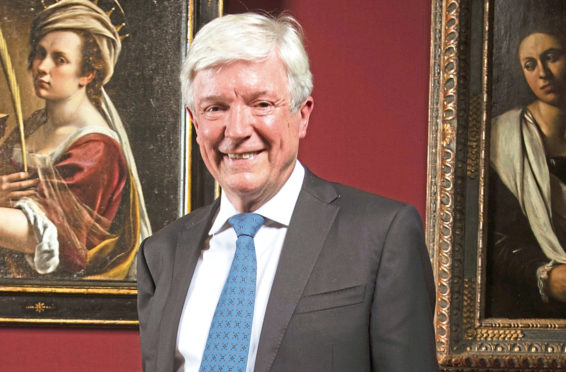
Former BBC director general Lord Hall resigned as chairman of the National Gallery yesterday as the fallout from the Diana interview scandal and ensuing cover-up engulfs the corporation.
Lord Hall was director of news when Martin Bashir used fake bank statements to persuade the princess to be interviewed on the Panorama programme in 1995.
An independent inquiry by Lord Dyson last week judged that Bashir was dishonest in how he obtained the interview and criticised the BBC for its 1996 investigation into the interview. There are further questions over why Bashir was reemployed by the BBC in 2016 despite the concerns around his conduct.
Lord Hall had told BBC governors Bashir commissioned the forged statements, but added: “I believe he is, even with this lapse, an honest and honourable man. He is contrite.”
Yesterday he said in a statement that he was stepping down as chair of the National Gallery, a role he had held since July 2020. He said: “I have always had a strong sense of public service and it is clear my continuing in the role would be a distraction to an institution I care deeply about.
“I am very sorry for the events of 25 years ago and I believe leadership means taking responsibility.”
It has also emerged that Prince William has been pained by the BBC’s continued screening of the interview with his mother which he believes played a part in ending his parents’ marriage and ultimately her death two years later. The Duke of Cambridge believes the interview should not be broadcast again.
The broadcaster has said it will not show the interview in full again but, according to sources, there is frustration within the royal family that clips continue to be aired.
Prince William, now a 39-year-old father-of-three, has been particularly affected by the interview and is determined nothing similar happens to anyone else.
He is also understood to be opposed to Netflix featuring the interview in any future episodes of The Crown, which will star Elizabeth Debicki as Diana in its fifth series depicting the early 1990s.
An insider said: “If there are any plans to continue to commercialise and exploit this, not just by the BBC but by any other outlets – upcoming episodes of The Crown, or whoever it might be – that would be of deep concern to him.”
Another source added: “The interview has always been a problem for William, it’s just, until now, the full extent of the problem was unknown.
“The whole thing has been very painful for him personally. The idea that she thought everyone was listening into her conversations – including him, as a child – he has found very difficult to come to terms with.
“There’s that, and then the commercialisation of it all that also really bothered him. The fact that the BBC not only covered it up but along with Bashir kept on getting loads of glory for the scoop.”
Lord Dyson found that Bashir engaged in “deceitful behaviour” and breached BBC rules by using the faked statements to convince Diana’s brother, Earl Spencer, to grant him access to her. Her family believe he deliberately played on her insecurities to fuel feelings of paranoia and suggest that even her closest aides were working against her.
The BBC then “fell short of the high standards of integrity and transparency which are its hallmark” with its internal investigation into the interview in 1996.
Whistleblowers who attempted to raise concerns about how the interview was obtained and then suffered “profound consequences” should have the possibility of compensation payments considered by the BBC, according to a senior Conservative MP.
Graphic designer Matt Wiessler – who was used by Bashir to forge the bank statements – claims he was sidelined after trying to expose the journalist’s methods.
Julian Knight, the chairman of the Commons Digital, Culture, Media and Sport Committee, yesterday said: “I think the BBC needs to have a real open mind in terms of the possibility of compensation, but also how it interacts with people like Mr Wiessler who clearly have faced quite profound consequences due to this fiasco.”
Sir Cliff Richard has also now spoken out about Bashir’s interview with the princess – who he was close friends with – as he said he had also been a “victim” of the BBC’s practices.
The 80-year-old singer won a High Court case against the BBC in 2018 after it filmed police raiding his home four years earlier. He was never arrested or charged, and a judge concluded he had a right to privacy.
Richard said: “I was not surprised when I heard of the BBC’s dastardly involvement in the Bashir interview with Princess Diana on the Panorama programme.
“Having been victim to the BBC’s craze for a TV scoop in August 2014, I had already lost all faith in those who control this one-time great institution.
“The management and staff involved at the time deserve all that must surely come their way.”

Enjoy the convenience of having The Sunday Post delivered as a digital ePaper straight to your smartphone, tablet or computer.
Subscribe for only £5.49 a month and enjoy all the benefits of the printed paper as a digital replica.
Subscribe